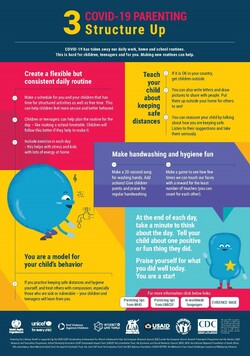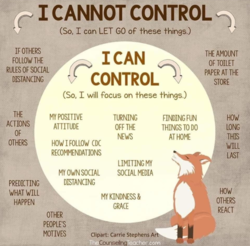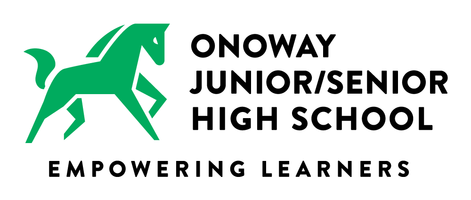Here is a toolkit AHS Mental Health has put together for members of the public for dealing with anxiety and stress related to COVID.
Information for Parents
Resources for Parents

During this difficult time -
For most of us, life feels anything but normal right now with the COVID-19 pandemic. Schools closed and working from home can cause an increased level of stress and anxiety. You will feel better if you can find ways to get stress out of your system. The best ways to relieve stress are different for each person. Try some of these ideas to see which ones work for you:
- Exercise! Regular exercise is one of the best ways to manage stress. Walking is a great way to get started while maintaining social distancing. Or, find creative ways to get your body moving such as a dance party or yoga in your living room.
- It can help to write about the things that are bothering you.
- Let your feelings out. Talk, laugh, cry, and express anger when you need to with someone you trust.
- Do something you enjoy. A hobby can help you relax.
- Learn ways to relax your body. This can include breathing exercises, muscle relaxation exercises, massage, aromatherapy or relaxing exercises stretching.
- Focus on the present. Try meditation and imagery exercises that bring you into the present. Try to look for the humour in life. Laughter really can be the best medicine.
- Text "COVID19Hope" to 393939 to get daily uplifting messages that can include links to build coping skills during COVID-19
- Healthy Together, is a guide to family and home life during COVID-19. Each weekday, new story about how families can be healthy, active and safe in these changing times will be posted. It also includes “Latest Mental Wellness Moment” with Dr. Nicholas Mitchell - AHS Provincial Medical Director for Addiction and Mental Health.
https://www.albertahealthservices.ca/news/Page15439.aspx
The World Health Organization created six one-page tips for parents cover planning one-on-one time, staying positive, creating a daily routine, avoiding bad behaviour, managing stress, and talking about COVID-19.
https://www.who.int/emergencies/diseases/novel-coronavirus-2019/advice-for-public/healthy-parenting
Mental Health Resources
Get Help Now
Emergency – 911
Health Link – 811
Important Phone Numbers
Addiction Helpline – 1-866-332-2322
Family Violence – Find Supports – 310-1818
Income Supports – 1-866-644-5135
Kids Help Phone – 1-800-668-6868, Text CONNECT to 686868
Mental Health Helpline – 1-877-303-2642
MyHealth.Alberta.ca: List of Important Numbers
Toll Free Crisis Line / Distress Centers
780 area code: 1-800-482-4357
403 area code: 1-800-784-2433
https://indigenous.link/indigenous-services-canada/
Online Chat Services
https://edmonton.cmha.ca/programs-services/online-crisis-chat/
Alberta Health Services has resources and services available to help you or someone you know. Remember, if you are struggling you are not alone. There are supports in place to help you.
https://www.albertahealthservices.ca/amh/Page16759.aspx
Resources for Scheduling your family and keeping things normal
Routines and schedules provide children with a sense of stability, security, and structure that can help keep boredom and frustration to a minimum. By having consistent routines you can create a new normal for your family. Include meal times, physical activity, breaks, time for creativity such as arts and crafts, and time for each of the core subjects (Math, Social, Science and English). You can create this schedules by using a piece of paper and colouring tools, or use an online schedule builder. Have your kids be a part of building their schedule as they will follow it better if they have input!
How to Talk to Your Teen about the Pandemic
As public conversations around COVID-19 increase, students may worry about themselves, their family, and friends. Parents and family members can play an important role in helping children make sense of what they hear in a way that is honest, accurate, and minimizes anxiety or fear. Canadian Mental Health provides tips for parents on how to talk to their teens.
The following information has been provided by Alberta Health Services and the U.S. Centre for Disease Control.
- Remain calm and reassuring.
- Remember that children will react to both what you say and how you say it. They will pick up cues from the conversations you have with them and with others.
- Make yourself available to listen and to talk.
- Make time to talk. Be sure children know they can come to you when they have questions.
- Avoid language that might blame others and lead to stigma.
- Remember that viruses can make anyone sick, regardless of a person’s race or ethnicity. Avoid making assumptions about who might have COVID-19.
- Pay attention to what children see or hear on television, radio, or online.
- Consider reducing the amount of screen time focused on COVID-19. Too much information on one topic can lead to anxiety.
- Provide information that is honest and accurate.
- Give children information that is truthful and appropriate for the age and developmental level of the child.
- Talk to children about how some stories on COVID-19 on the Internet and social media may be based on rumors and inaccurate information.
- Teach children everyday actions to reduce the spread of germs.
- Remind children to stay away from people who are coughing or sneezing or sick.
- Remind them to cough or sneeze into a tissue or their elbow, then throw the tissue into the trash.
- Discuss any new actions that may be taken to help protect children and school staff. (e.g., increased handwashing, cancellation of events or activities)
- Get children into a handwashing habit.
- Teach them to wash their hands with soap and water for at least 20 seconds, especially after blowing their nose, coughing, or sneezing; going to the bathroom; and before eating or preparing food.
- If soap and water are not available, teach them to use hand sanitizer. Hand sanitizer should contain at least 60% alcohol. Supervise young children when they use hand sanitizer to prevent swallowing alcohol.
https://www.camh.ca/-/media/files/camh_covid19_infosheet-talking_to_kids-pdf.pdf
How to Keep your Teen Busy
Keeping busy with continued learning. Taken from Alberta Education;
- School authorities will offer at-home learning opportunities for all Kindergarten to Grade 12 students online or through accommodations like course packages and telephone check-ins.
- Teachers will determine what content to cover based on remaining curricular outcomes and plan tasks that are reasonable to do from home.
Grades 7 to 9
Education content will focus on core curriculum outcomes of:
- mathematics
- language/literacy
- science
- social studies
- Teachers will assign an average of 10 hours of work per student per week and must work with students and parents to deliver these materials.
Grades 10 to 12
Education content will focus on specified and core courses required for high school graduation requirements, including:
- language (English, French and French Language Arts)
- social studies
- mathematics
- biology
- chemistry
- physics
- Teachers will deliver content from other courses where possible.
- Teachers will assign an average of 3 hours of work per course per week and must work with students and parents to deliver these materials.
Keeping your teen active and encourage them to burn off their energy may be particularly challenging, but even with social distancing you should still have some options. Going for walks, creating an obstacle course around your house, or playing music and dance videos can be a fun way to get them active. Here are some links to a few fun ideas;
https://www.youtube.com/watch?v=pj4TVbnIEgk 10 minute no equipment work-out for teens
https://www.youtube.com/watch?v=5if4cjO5nxo fun cardio workout for the whole family!
https://www.youtube.com/watch?v=Rj2IubFfEqY for those dance lovers, try this routine!
Chores are essential! Many experts agree that helping around the house earlier in the day helps remind teens and kids that they’re an important part of their family units. But it also can minimize stress on the parents and give your teens a break from screen time. Plus, adding in chore time to when parents might be cleaning themselves helps encourage kids to join in. Teens also need that positive reinforcement of a job well done!
Alberta Education Info -Mar 20
Please review this link posted by Alberta Education as of March 20.
Big item -No diploma exams for the 2019/20 school year.
OJSH has been working in the right direction for gr 8-12 program continuity, even before this was released
Please email ohs@ngps.ca if you have questions .
COVID 19 Websites for Accurate Information
Please review these verified Government of Alberta websites for updated information on COVID 19
Government of Alberta COVID 19 website: https://www.alberta.ca/coronavirus-info-for-albertans.aspx#toc-9
Alberta Heath Services COVID 19 website: https://www.albertahealthservices.ca/topics/Page16944.aspx
HOW ARE YOU DOING?

No, really. How are YOU doing?
Take a pause...And think…. How are you doing?
Let’s take a moment to do a self- assessment.
How is your heart rate?
How quick are your breaths?
Your shoulders: how tense are they?
Your face: are you frowning? Do your eyebrows look strained?
Where are you holding the tension? Your temples? Your shoulders? Your back? Stomach?
Your thoughts: are they scattered? How much water are you drinking? Are you getting outdoors for fresh air, for a walk? How are you eating? Too little, too much?
How is your connection with others? Are you reaching out with a phone call, FaceTime, a conversation face to face (keeping a 6-foot distance)?
How much are you reading and watching the news and social media? Do you need to shut it off for a while?
Are negative and anxious thoughts flooding your mind? Do you feel like it takes too much energy to accomplish simple tasks?
We are all busy looking after our kids, our co-workers, our parents, our neighbors, but we must do a check in with ourselves, as well. We are in uncharted waters and in unprecedented times. It is in times such as this that we need to check in on how our body, mind and soul are coping. We could be in this situation for a while so it is crucial to stay strong and courageous: physically, spiritually and emotionally.
As you read this, take a deep breath through your nose, slowly exhale through your mouth. Roll your shoulders forward and backward a few times. Hang your head to one side for a few seconds, then the other. Keep breathing, slowly and deeply.
Though we are feeling pressure on all sides, we are not crushed. We may be confused and bewildered at the global crisis, which is now so close to home, but we do not need to be given to despair.
The Alberta Health Services has launched Text4Hope, a free service that reminds us to focus on positive thinking during challenging times. Text COVID19HOPE to 393939 to subscribe.
The Mental Health Help Line is open 24/7 at 1-877-303-2642. The Kids Help Line is 1-800-668-6868. If you are needing assistance while isolating, please call 310-0000 or go online at https://www.alberta.ca/coronavirus-info-for-albertans
Reach out to those you care about. Keep your diet healthy and balanced. Go outside regularly for a dose of sunshine and movement. We have an advantage living in rural and small town Alberta that makes it easy to go outside and maintain appropriate, safe distances. Flood your mind with calming and uplifting messages and music. Despite the physical distance that is required, we are so fortunate to have countless ways to connect with our friends and family. Journal your experience, your thoughts, your fears, what you are learning, what you appreciate, what you are grateful for.
Remember: We were made to do difficult things
We are in this together
You are not alone
Note: This article was submitted by Tammy Charko, BA, BSW, RSW. Tammy is Northern Gateway Public School’s Student Support Facilitator. . She is a support for schools, staff, parents and students to ensure success in schools. Tammy advocates for students and provides the link between students and the families and other supports in the community. Tammy is mom to 4 teenagers.How are you doing?
